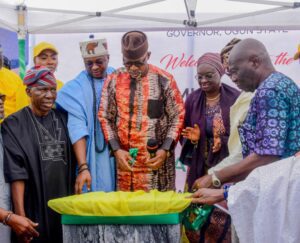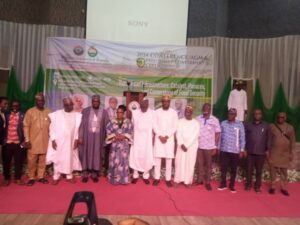
Power: FG to adopt bottom-up approach to address challenges —Minister
The Federal Government on Thursday said that it would adopt a bottom-up approach to address challenges in the power sector.
It said this would go a long way in improving the electricity supply in the country.
The Minister of Power, Mr Adebayo Adelabu, said this at the 2023 Power Correspondents Association of Nigeria (PCAN) conference in Abuja.
The Minister was represented by the Director Transmission, Ministry of Power, Mr Emmanuel Anosike.
Adelabu said that as part of the strategy in the power sector road map, emphasis would be on the bottom-up approach, unlike the top-down method being used in the past.
“The implication, with the bottom-up approach, is that we will prioritise metering, distribution and transmission infrastructure.
“We will focus on customers down to distribution and transmission infrastructure in the short term; this is to ensure that a significant portion of what is generated currently gets to the end users.
“We will also pay attention to the generation segment, particularly in areas of distributed (embedded) power from renewable energy sources.
“While at the same time advancing base load power through thermal and hydro plants in the medium to long term,” he said.
The Minister also said that the ministry would further explore the regional energy potential by focusing on solar energy in the North and mini hydro power plants in the Middle belt.
According to him, the ministry will focus on the Southwest, hybridised with solar while the country’s coastal states will be identified for wind energy utilisation.
“Taking all the above into consideration, especially with the liberalisation of the sector, Nigerians will soon start to experience the objective that led to the Electricity Act which is to improve power supply across the country.
“The choice of the theme for the workshop; ‘Resolving Nigeria’s Power Crisis: The Implication of the Electricity Act 2023,’ is apt, considering the president’s avowed desire to provide regular supply of electricity across the country.
“This will liberalise the sector through the enactment of the 2023 Electricity Act,” he said.
The Minister said that the Electricity Act was a significant part of the energy roadmap as it clearly signified the present administration’s commitment to the transformation of the power sector.
According to him, this is clearly stated in the agenda of President Bola Tinubu as contained in the Renewed Hope Agenda.
“I would like to emphasise the role of the media in terms of communication and advocacy.
“For the sector to progress, we must advocate against power theft, vandalism and educate consumers against sabotage.
“The financial liquidity in the NESI is dependent on customers paying for electricity consumed,” he said.
Earlier, PCAN Chairman, Mr Obas Esiedesa, called on the Federal Government to take a holistic review of the entire power sector privatisation
He recalled that on Nov. 1, the Federal Government handed over the distribution and most generation assets to the private sector.
He said that since then, expectations raised by the entrance of private entrepreneurs into the sector had largely remained unmet.
“Ten years down the line, the time has come for the Federal Government to take a holistic review of the entire power sector privatisation.
“Not necessarily taking away the assets from operators, but finding solutions to the huge challenges facing the industry,” he said
Esiedesa said that the Electricity Act 2023, had prescribed far-reaching changes to how the sector had been governed in the past, especially the devolution of power to the states.



